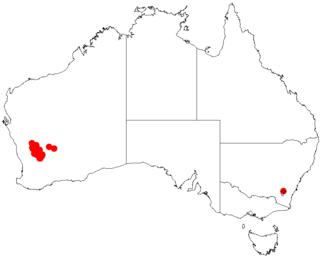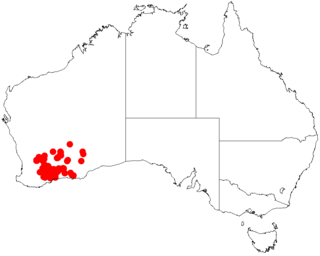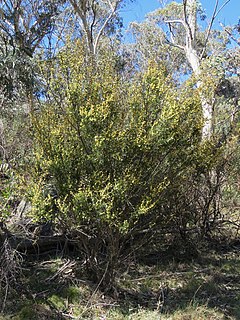
Acacia hamersleyensis, also known as Karijini wattle or Hamersley Range wattle, is a tree or shrub belonging to the genus Acacia and the subgenus Juliflorae. It is endemic to a small area in central Western Australia.

Acacia jibberdingensis, also known as Jibberding wattle or willow-leafed wattle, is a shrub or tree belonging to the genus Acacia and the subgenus Juliflorae that is endemic to Western Australia.

Acacia oncinocarpa is a shrub or tree belonging to the genus Acacia and the subgenus Juliflorae that is endemic to northern Australia.

Acacia oncinophylla, commonly known as hook-leaved acacia, is a shrub belonging to the genus Acacia and the subgenus Juliflorae.
Acacia paula is a shrub belonging to the genus Acacia and the subgenus Juliflorae that is endemic to a small area of north western Australia.

Acacia ptychophylla is a shrub belonging to the genus Acacia and the subgenus Juliflorae the is endemic to arid areas of north western Australia.

Acacia dempsteri is a shrub belonging to the genus Acacia and the subgenus Phyllodineae endemic to south western Australia.

Acacia densiflora is a shrub of the genus Acacia and the subgenus Plurinerves that is endemic to an area of south western Australia.

Acacia eremaea is a shrub or tree of the genus Acacia and the subgenus Plurinerves that is endemic to an area in western Australia.

Acacia kenneallyi is a shrub or tree of the genus Acacia and the subgenus Plurinerves that is endemic to north western Australia.

Acacia obtecta is a shrub of the genus Acacia and the subgenus Plurinerves that is endemic to a small area in south western Australia.
Acacia pelophila is a shrub of the genus Acacia and the subgenus Plurinerves that is endemic to a small area along the west coast of western Australia.

Acacia uncinella is a shrub of the genus Acacia and the subgenus Plurinerves that is endemic to an area of south western Australia.

Acacia undosa is a shrub of the genus Acacia and the subgenus Plurinerves that is endemic to an area of south western Australia.

Acacia vittata, commonly known as Lake Logue wattle, is a shrub of the genus Acacia and the subgenus Plurinerves that is endemic to a small area in western Australia.

Acacia warramaba is a shrub of the genus Acacia and the subgenus Plurinerves that is endemic to an area of south western Australia.

Acacia siculiformis, commonly known as dagger wattle, is a shrub belonging to the genus Acacia and the subgenus Phyllodineae native to south eastern Australia.

Acacia microcarpa, commonly known as manna wattle, is a shrub belonging to the genus Acacia and the subgenus Phyllodineae endemic to south eastern Australia.

Acacia cataractae is a shrub belonging to the genus Acacia and the subgenus Juliflorae that is native to northern Australia.

Acacia meiosperma is a shrub or tree belonging to the genus Acacia and the subgenus Juliflorae that is native to north eastern Australia.



















